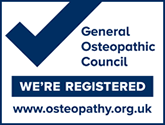What to expect during my appointment?
At the start of your first session, your osteopath will ask you to tell them about your problem. They will ask questions about your medical history and lifestyle as well as your symptoms. This is very important as it will help them to make an accurate diagnosis and suggest appropriate treatment. Your information will be recorded and kept securely.
The osteopath will need to examine the area(s) of your body causing discomfort. Sometimes the cause of the problem may be in a different area to the pain, (For example, a difference in leg length may result in compensations in the upper back which might result in neck pain) so they may need to examine your whole body. They will need to feel for tightness in the muscles and stiffness in the joints and may need to touch/palpate these areas to identify problems. They will explain what they are doing as they go along. If you are uncomfortable with any part of this, you have the right to ask them to stop at any stage without prejudicing your future treatment.
In order to examine you effectively, it may be necessary for your osteopath to ask you to remove some clothing as appropriate for the condition. Sometimes this might mean undressing down to your underwear. If you are uncomfortable with this, please make your osteopath aware of how you feel and discuss whether it might be appropriate for them to treat you whilst you wear shorts and a t-shirt.
Your osteopath will suggest a course of treatment, which may require just one or several visits. They may be able to give you an estimate of how often they need to see you and any associated costs by the end of the first session. They will ask for your permission to provide treatment and you may be asked to sign a consent form.
Most osteopaths will begin your treatment at your first appointment, but sometimes they may require further tests first i.e. blood tests or scans. Occasionally they may diagnose an illness that they are unable to treat and may suggest that you consult your GP or another appropriate health professional. You may experience mild discomfort with some of the treatment techniques used, but osteopathic treatment is usually a very gentle process. Your osteopath will let you know if any discomfort is likely and it can be helpful to let them know what you are feeling. If pain persists after treatment, contact your osteopath for advice.
You are welcome to bring someone with you for all or part of your consultation. Children (under16) should always be accompanied by a parent, guardian or chaperone over the age of 18. If you have any other questions, ask your osteopath.




